- News
- Reviews
- Bikes
- Components
- Bar tape & grips
- Bottom brackets
- Brake & gear cables
- Brake & STI levers
- Brake pads & spares
- Brakes
- Cassettes & freewheels
- Chains
- Chainsets & chainrings
- Derailleurs - front
- Derailleurs - rear
- Forks
- Gear levers & shifters
- Groupsets
- Handlebars & extensions
- Headsets
- Hubs
- Inner tubes
- Pedals
- Quick releases & skewers
- Saddles
- Seatposts
- Stems
- Wheels
- Tyres
- Tubeless valves
- Accessories
- Accessories - misc
- Computer mounts
- Bags
- Bar ends
- Bike bags & cases
- Bottle cages
- Bottles
- Cameras
- Car racks
- Child seats
- Computers
- Glasses
- GPS units
- Helmets
- Lights - front
- Lights - rear
- Lights - sets
- Locks
- Mirrors
- Mudguards
- Racks
- Pumps & CO2 inflators
- Puncture kits
- Reflectives
- Smart watches
- Stands and racks
- Trailers
- Clothing
- Health, fitness and nutrition
- Tools and workshop
- Miscellaneous
- Buyers Guides
- Features
- Forum
- Recommends
- Podcast
review
£1,400.00
VERDICT:
Comfortable ride and upright position with race worthy stiffness and handling
Weight:
8,740g
Contact:
www.evanscycles.com
At road.cc every product is thoroughly tested for as long as it takes to get a proper insight into how well it works. Our reviewers are experienced cyclists that we trust to be objective. While we strive to ensure that opinions expressed are backed up by facts, reviews are by their nature an informed opinion, not a definitive verdict. We don't intentionally try to break anything (except locks) but we do try to look for weak points in any design. The overall score is not just an average of the other scores: it reflects both a product's function and value – with value determined by how a product compares with items of similar spec, quality, and price.
What the road.cc scores meanGood scores are more common than bad, because fortunately good products are more common than bad.
- Exceptional
- Excellent
- Very Good
- Good
- Quite good
- Average
- Not so good
- Poor
- Bad
- Appalling
The BMC GF02 105 is BMC's take on the endurance/sportive bike category, joining the likes of Specialized and Trek in offering a more comfortable bike which can also be raced. Its carbon big brother – the GF01 – was developed with the northern classics in mind and has been raced there with success under the likes of Thor Hushovd and Taylor Phinney. Evidently, the race pedigree is there, but what remains to be seen is how this translates to the cheaper aluminium framed 02.

For a full rundown of the GF02s technical specs, see the 'Just In' feature. In brief, the GF02 is made from a heavily shaped tripled butted 6000-series alloy, and features some eye-catching kinks to add compliance to what is traditionally seen as a 'harsh' material. The 105 model tested comes complete with a full (no substitutions) Shimano 105 groupset and R-501 wheels, also from the big S. Cockpit duties are handled by a mix of Easton and BMC's own 'compliance post' while Continental Ultra Sport tyres keep everything rolling.
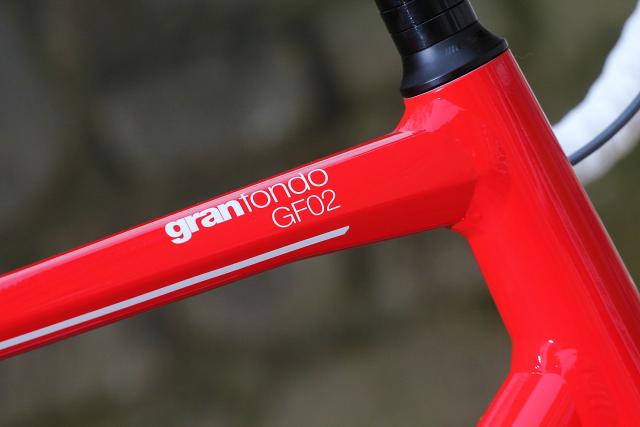
As expected, the slacker headtube angle (about 1 degree slacker across all sizes) and increased wheelbase produce a bike that is noticeably slower handling than a typical out and out race bike. For the cobbles of Flanders, and indeed, most UK roads, the increased stability is welcomed and enables you to enjoy the ride a little more. This stability really shines through when descending down steep and rough roads that often leave twitchier bikes feeling downright dangerous.

When pressed into racing duties, the GF02 performs admirably well. Sure, it doesn't possess the instant responses of a true race bike, but it was easy to adapt to the handling and the different steering input required. Indeed, I found that the learning curve was much shallower going from a race bike to the GF02 than the other way around.
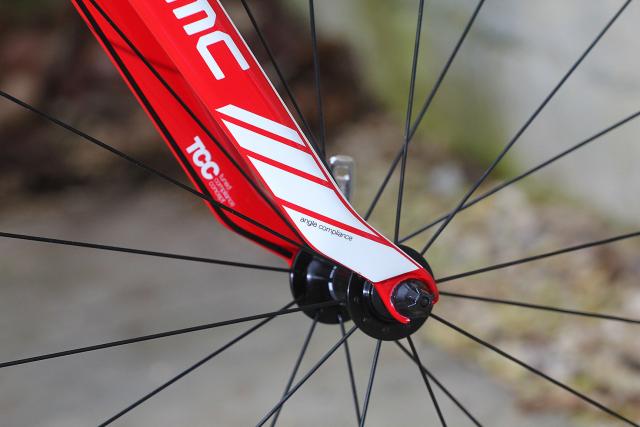
While the mismatch between the oversized front triangle and the spindly seat stays might not be everyone's cup of tea aesthetically, there's no doubting the drivetrain stiffness that results from the large diameter tubes. I raced the GF02 on a number of occasions and never felt that I was losing any power through frame flex. It certainly ticks the race-ready box from this point of view.
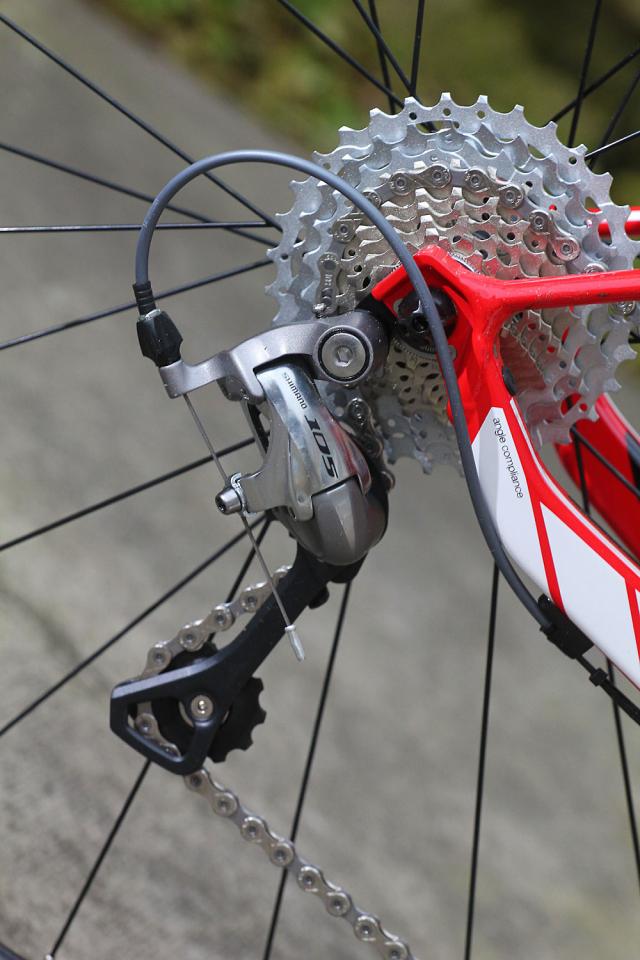
Up front, the tall (but not overly so) headtube is oversized at the lower bearing race, which is matched by an equally stout fork crown. Coupled with the increased wheelbase, the GF02 was a lot of fun when carving around hairpin turns.
How it fares on the comfort front is a little harder to pin down. That said, it's safe to say that most of the credit for the smooth ride – and it is smooth – has to go to the 28mm Ultra Sport tyres. It's unusual to find such high volume tyres specified as standard, but they fit perfectly with the GF02's intended usage. For day-to-day riding they are simply miles better than 23mm or even 25mm tyres.
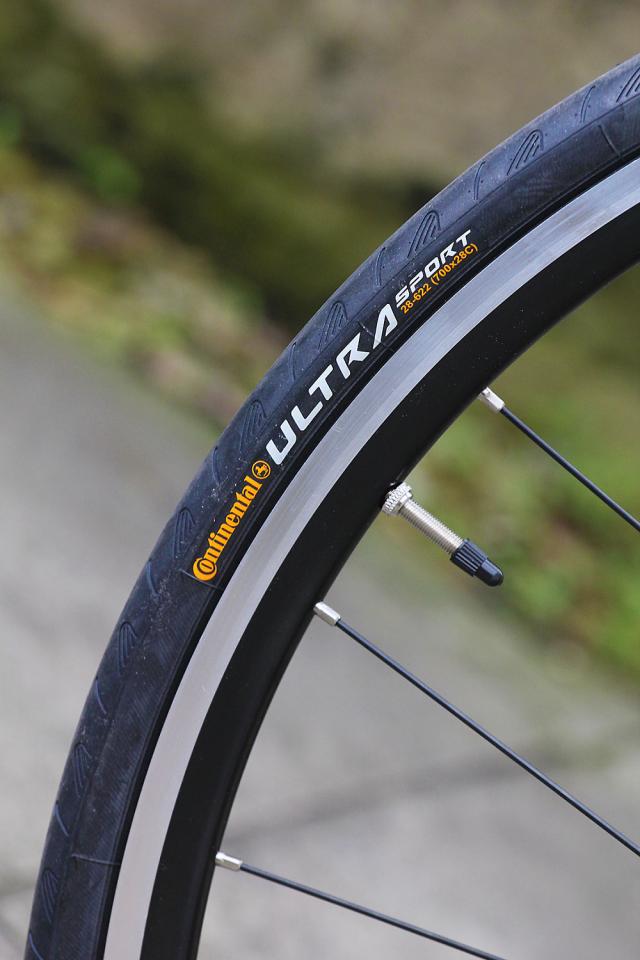
While specifying 'own-brand' finishing kit is usually seen as a cost cutting measure, BMC's proprietary 'compliance post' lives up to its name, damping higher frequency vibrations in the way well-designed carbon fibre does. The offset head provides some degree of flex for taking the sting out of larger hits, but this isn't as noticeable as the reduced road chatter. As an added bonus, the two bolt seatpost head makes it really easy to adjust saddle angle.
Swapping in my standard 23mm training tyres (Michelin Krylion Carbons), and a cheap aluminium seatpost revealed just how much these two factors contribute to comfort in the saddle. Perhaps the best thing about the frame design is that it will happily accept 28mm tyres whilst still maintaining some degree of raceability.

An unintended consequence of the kinky (gettit?) seat stays and fork is that they make it hard (impossible in some cases) to fit clip-on mudguards. The GF02 doesn't include eyelets for 'guards which seems like a bit of an oversight to me, and clip-on options such as the Crud Raceguards are typically less adjustable and can't accommodate the odd angles and tube positions.
When it comes to fit, the shorter reach and longer headtube yield a position which is more likely to suit the vast majority of riders, who don't have the flexibility or the desire to ride as long and low as the pros. I've ridden bikes this size which much taller headtubes and many with shorter headtubes, and the GF02 seems to strike a good balance between these extremes. A quick glance at the BMC Racing Team's bikes when lined up for the spring classics proves that it's still possible to achieve an aggressively low front end should you wish, you'll just have to use a -17 degree stem or similar.
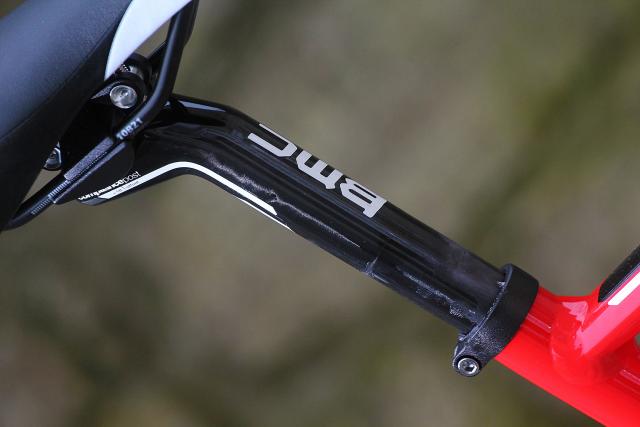
The full 105 groupset is good to see and has proved its performance and reliability over a few years now. That being said, a number of other bikes in this price range manage to incorporate some Ultegra level components into the spec, even if it's only a rear derailleur. Others offer a similar spec only attached to a carbon frame, though it goes without saying that a carbon frame doesn't necessarily make it 'better'.
The eagle-eyed among you will notice the inclusion of a medium cage rear derailleur, which is required to shift the 11-32 cassette. The 34x32 small gear will be a welcome sight for many and it certainly won me over when having to tackle a 1 mile at 10% climb just to get in on my commute every day.
The wheels are another area where the spec could have been improved for better value. The Shimano R-501 wheels are true workhorses, and in my many years riding on them I've never once had to true a set, but they are very heavy and deaden the ride a great deal. I've previously mentioned the fact that the GF02 is quite happy toeing a start line, but if planning on racing regularly, a wheel upgrade should be the first item on the list.
Verdict
Comfortable ride and upright position with race worthy stiffness and handling.
road.cc test report
Make and model: BMC GF02 105 (2013)
Size tested: 58cm
About the bike
State the frame and fork material and method of construction. List the components used to build up the bike.
Frame: triple butted 6000-series aluminium
Size: 48 / 51 / 54 / 56 / 58 / 61
Fork: "compliancefork", full carbon
Crankset: Shimano 105, 50-34
Cassette: Shimano 105, 11-32
Front Derailleur: Shimano 105
Rear Derailleur: Shimano 105
Shifter: Shimano 105
Brakes: Shimano 105
Handlebar: Easton EA30
Stem: Easton EA70
Seatpost: "compliancepost", full carbon, with 18mm offset
Saddle: Selle Royal Saba
Hubs: Shimano R-501
Rims: Shimano R-501
Tyres: Continental Ultra Sport 28mm
Tell us what the bike is for, and who it's aimed at. What do the manufacturers say about it? How does that compare to your own feelings about the bike?
The GF02 105 is aimed at the "everyday" rider looking for a bike suited to typical UK riding conditions whilst still retaining a degree of raceability.
BMC certainly don't mince their words calling the GF02 the "best aluminium road bike"
Frame and fork
Overall rating for frame and fork
8/10
Tell us about the build quality and finish of the frame and fork?
The frame is well put together as you'd expect from a reputable brand such as BMC.
Tell us about the materials used in the frame and fork?
6000 series aluminium isn't anything out of the ordinary and the full carbon fork is a standard feature on bikes at this price. What sets the GF02 apart is the shaping of the tubes. The spindly seat stays attach low and include a noticeable kink to reduce their bracing angle even further.
Tell us about the geometry of the frame and fork?
The head tube is about 1 degree slacker across all sizes compared to typical race geometry, increasing the wheelbase.
How was the bike in terms of height and reach? How did it compare to other bikes of the same stated size?
The reach is shorter, and the stack larger than a race bike, but not overly so. It's still possible to achieve an aggressive front end position given the right stem.
Riding the bike
Was the bike comfortable to ride? Tell us how you felt about the ride quality.
The GF02 is noticeably smooth over rough road surfaces and the slower handling means it was less likely to get pinged off line by irregularities. It was difficult to determine whether it was the frame itself which was comfortable, or if it was just the 28mm tyres which are included as standard
Did the bike feel stiff in the right places? Did any part of the bike feel too stiff or too flexible?
Front triangle stiffness was good enough to be raced on.
How did the bike transfer power? Did it feel efficient?
See above.
Was there any toe-clip overlap with the front wheel? If so, was it a problem?
A very slight amount but then my foot size and cleat position mean that I have this problem on every bike. Most shouldn't have a problem.
How would you describe the steering? Was it lively, neutral or unresponsive? Neutral.
Tell us some more about the handling. How did the bike feel overall? Did it do particular things well or badly?
The handling was slower than a race bike, but easy to adapt such that the difference wasn't really noticeable after a few rides. It excelled on steep and rough descents where it felt planted to the ground.
Which components had the most effect (good or bad) on the bike's comfort? would you recommend any changes?
The 28mm Ultra Sport tyres. For training and general riding, these are a better choice than narrower tyres.
Rate the bike for efficiency of power transfer:
7/10
Good enough for racing purposes.
Rate the bike for acceleration:
5/10
The heavy wheels and overall weight let it down here.
Rate the bike for sprinting:
5/10
As above, getting the bike to spurt forwards was hampered by its weight.
Rate the bike for high speed stability:
8/10
Unflappable in high speed corners, especially if they were rough.
Rate the bike for cruising speed stability:
7/10
Rate the bike for low speed stability:
7/10
Rate the bike for flat cornering:
7/10
Rate the bike for cornering on descents:
8/10
I was really impressed with how good it felt carving round hairpins.
Rate the bike for climbing:
5/10
Again, the weight is holding it back.
The drivetrain
Rate the drivetrain for performance:
8/10
It's 105, what more can be said?.
Rate the drivetrain for durability:
8/10
Rate the drivetrain for weight:
6/10
Rate the drivetrain for value:
7/10
No Ultegra, but then again there are no cheap substitutions either.
Wheels and tyres
Rate the wheels and tyres for performance:
6/10
Comfortable tyres, but heavy wheels.
Rate the wheels and tyres for durability:
8/10
No punctures.
Rate the wheels and tyres for weight:
5/10
Rate the wheels and tyres for comfort:
9/10
Rate the wheels and tyres for value:
7/10
Controls
Rate the controls for performance:
7/10
Good seatpost. Bars and stem are pretty unremarkable.
Rate the controls for durability:
7/10
No problems no far
Rate the controls for weight:
6/10
Rate the controls for comfort:
8/10
The proprietary seatpost dampens high frequency vibrations effictively
Rate the controls for value:
6/10
Your summary
Did you enjoy riding the bike? Yes.
Would you consider buying the bike? Yes, though it's up against some tough competition at this price point.
Would you recommend the bike to a friend? Yes.
Rate the bike overall for performance:
7/10
Rate the bike overall for value:
6/10
About the tester
Age: 21 Height: 190cm Weight: 69kg
I usually ride: Canondale EVO Red My best bike is:
I've been riding for: 5-10 years I ride: Every day I would class myself as: Semi pro
I regularly do the following types of riding: road racing, time trialling, cyclo cross, commuting, mtb,
For 5 years, racing was my life and I went all the way from a newbie bonking after 40 miles, to a full-timer plying my trade on the Belgian kermesse scene. Unfortunately, the pro dream wasn't meant to be and these days, you're more likely to find me bimbling about country lanes and sleeping in a bush on the side of the road.
Latest Comments
- Aluminium can 2 hours 14 min ago
Its not a booby trap as it says clearly right on the side the outcome of cutting it. The same as aerosol paint cans have warnings not to...
- eburtthebike 2 hours 34 min ago
A comedian with a purpose can achieve more than the politicians e.g. Zelesky.
- Hirsute 4 hours 10 min ago
Sounds a bit specific though given 90% are bought on some sort of finance.
- Rekrab 4 hours 28 min ago
MORE LANES, MORE LANES!!!!
- Simon E 4 hours 35 min ago
The numbers don't tell anything like the whole story....
- Simon E 5 hours 6 min ago
Just squirt some thick grease all over his side windows and door panels. If you're feeling really uncharitable you could throw some sand at the...
- David9694 5 hours 46 min ago
check under 'W'for "What cars do to people"
- Global Nomad 6 hours 27 min ago
good to see you're testing the farsports wheels - hope to see road.cc continue to expand the range of brands it considers. These or the shallower...
- chrisotherwise 7 hours 1 min ago
Sadly very normal. And the sand contains loads of evil little shards of flint.

























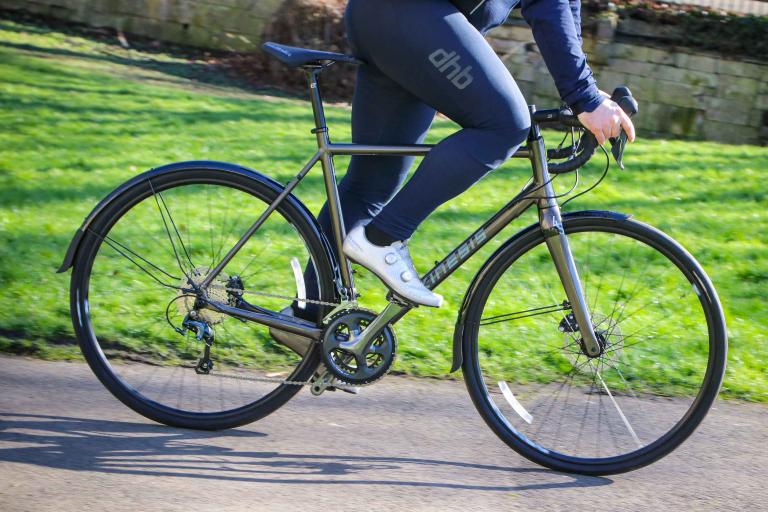
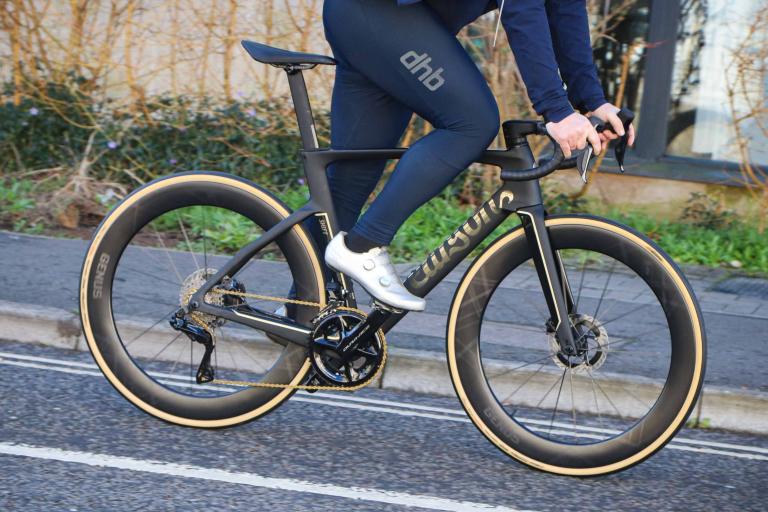
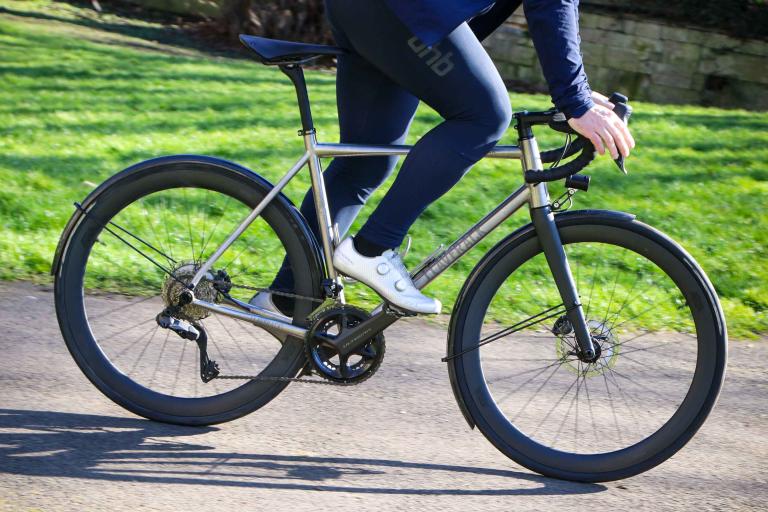
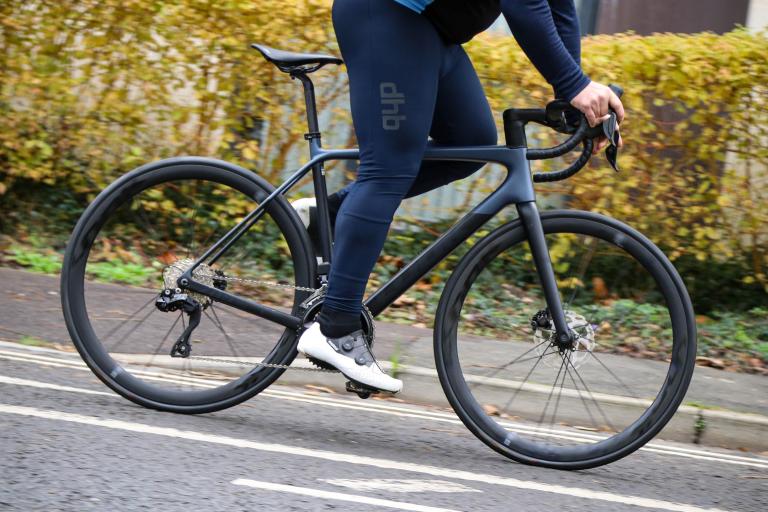
Add new comment
4 comments
didn't your mum ever tell you to ask nicely?
anyway, it's on the list of bikes we're trying to get in.
'Mid-range alu bike offers mid-range performance' - what a shocker. How about a review of the GF02 Disc? I can't find one anywhere; and why the hankering for an upgraded rear mech? That'd probably be the lowest bang/buck upgrade possible.
Can't believe that kink in the seat stay can be good for longevity
Consider a SKS X-dry mud guard which attaches to the seat post.